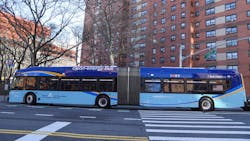MTA deploys newest all-electric articulated bus fleet to Harlem
A new pilot program has been announced by the Metropolitan Transportation Authority (MTA) that will bring its all-electric articulated bus fleet to the M60 Select Bus Service (SBS) to enhance and modernize the bus fleet.
New York City Transit’s (NYCT) all-electric articulated buses represent its next generation of buses that will eventually serve all five boroughs thanks to funding from the MTA’s 2020-2024 Capital Plan.
“We’re very excited to bring our newest bus, an all-electric articulated vehicle, to the M60 Select Bus Service route where our Harlem and Astoria customers can benefit from its quieter, greener, zero-emissions technology,” said Craig Cipriano, acting president of MTA Bus Company and senior vice president of NYCT’s Department of Buses. “With this new M60 pilot program on one of our longest service routes, we will test the range of the new fleet and the durability of the electric battery technology, which will inform our plans to buy more all-electric buses in the next few years.”
The MTA says it removes 17 million metric tons of carbon emissions from the air per year by providing public transit services as an alternative to personal vehicle use, and an all-electric bus fleet would further reduce New Yorkers’ carbon footprint. All-electric propulsion technology also results in quieter operations in addition to the benefits of zero tail-pipe emissions, which make it ideal for operating vehicles in densely populated areas such as New York City. All-electric buses use an electric motor powered by a battery pack, and its propulsion systems recapture energy normally wasted in braking. Articulated buses, which are higher-capacity, 60-foot-long buses used on SBS as well as on higher ridership routes, are ideal for electrification when used in densely populated urban areas where carbon emissions and traffic noise are public concerns.
In January 2019, the MTA Board approved the purchase of 15 all-electric articulated buses, 16 in-depot chargers and one mobile charging unit from New Flyer of America Inc. NYCT has taken delivery of five of the 15 buses so far, with four put into service on the M14 SBS route using newly installed charging equipment at the Michael J. Quill Bus Depot and existing on-street fast chargers on 42nd Street. The buses have 466kWh batteries with an expected range of 50 to 90 miles depending on weather, passenger oad, operating speed and street grade. As these vehicles are the MTA’s first articulated electric buses, pilot programs such as the M60 test will provide experience and data to confirm the range under various conditions in NYCT service. The M60 pilot includes one electric articulated bus fitted with luggage racks to accommodate weekday morning customers traveling to and from LaGuardia Airport, the M60’s Queens terminus.
The MTA’s fleet of electric articulated buses are fully charged overnight at the Michael J. Quill Bus Depot, where new charging equipment installation is currently ongoing. Due to the long length of the M60 route – approximately 20 miles round trip – NYCT will closely monitor battery usage of the dedicated articulated bus with the eventual goal of completing 12 hours of continuous service without requiring additional charging.
The new electric articulated buses are the next generation of MTA buses as the MTA prepares to purchase 500 electric vehicles as part of its 2020-2024 Capital Plan and move toward an all-electric fleet by 2040. The MTA also operates a fleet of 10 electric standard buses, which are leased for a three-year pilot program to test the all-electric technology for capability and durability of around-the-clock four-season usage. The data from that standard electric bus pilot helped inform the procurement process for NYCT’s recent Request for Proposals for a base order of 45 standard electric buses that will be put into service in all five boroughs upon delivery beginning late 2021. The 500 new electric buses funded by the 2020-2024 Capital Plan will be deployed in neighborhoods across the five boroughs as they are delivered, after bus depots are upgraded to accommodate the new technology.
Other bus service initiatives to improve service and speed up rides include redesigning every borough’s bus route network, implementing automated bus lane enforcement on fleet vehicles and streets, working with the New York City Department of Transportation through the expansion of transit signal priority and other transit priority features, and collaborating with NYPD to enforce bus lanes.
